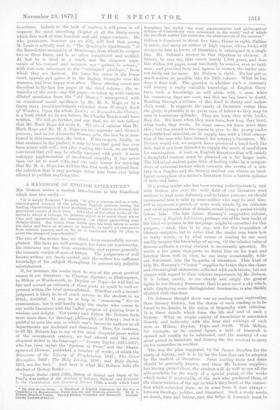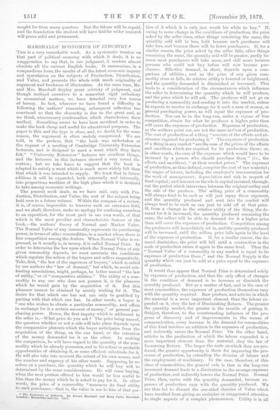A HANDBOOK OF ENGLISH LITERATURE.* MB. DOBSON writes a modest
introduction to this Handbook which does him credit :—
" It is simply designed," he says, "to give a concise, and as a rule, chronological account of the principal English authors, noting the leading characteristics of their productions, and where necessary, the prominent events of their lives. Like that of the other books of the series to which it belongs, its primary object is to assist those whose time and opportunities are restricted,—an object prescribing very definite limits. But within these limits care has been taken to make the dates and facts as accurate as possible, to verify' all statements
from reliable sources, and as far as is consistent with its plan, to avert the charge of superficiality."
The aim of the writer has, we think, been successfully accom- plished. His facts are well arranged, his dates are trustworthy, his criticisms are free from eccentricity, and express generally the common verdict of men of letters. The judgments of well known writers are freely quoted, and the author has sufficient knowledge of his subject throughout to prevent any palpable misstatement.
If, for instance, the reader turn to any of the great poetical names in our literature—to Chaucer, Spenser, or Shakespeare, to Milton or Wordsworth, to Dryden or Pope—he will find as fair and correct an estimate of these poets as could be well ex- pressed within the brief space allotted. Whether such a laconic judgment is likely to be of much service to the student is, we think, doubtful. It may be of help in " cramming " for an examination, but it will hardly help the reader who comes to our noble literature with the higher purpose of gaining from it wisdom and delight. For poetry and fiction Mr. Dobson. finds more room than for theology, philosophy, or history ; but it is painful to note the way in which one's favourite authors in all departments are docketed and dismissed. Here, for instance,
is all Mr. Dobson has to say of the most eloquent prose writer of the seventeenth century, we had almost said the most eloquent writer in the language :—" Jeremy Taylor (1613-1667),
who has been styled the Spenser of Prose' and the Shake- speare of Divines,' published a number of works, of which the Discourse of the Liberty of Prophesying, 1647; The Great Ememplar, 1649; The Holy living, 1650; and Holy .Dying,
1651, are the best." And here is what Mr. Dobson tells the student of Bishop Butler :—
"Joseph Butler (1692-1752), Bishop of Bristol and Dean of St' Paul's, was author of the Analogy of Religion, Natural and Revealed, to the Constitution and Course of Nature, 1736, a work which Lord • The civil &ram Series. A Handbook of English Literature, for the Use of Candidates for Examinations, Public Schools. and Students generally. By H. A. Dobson (Board of Trade). Second Edition, Corrected and Extended. London: Crosby Lockwood and Co. Brougham has styled 'the most argumentative and philosophical' defence of Christianity ever submitted to the world,' and of which, the excellent matter has overcome the abstruseness of the manner." Gibbon is dismissed in about five lines, Hume in eight, Hallam iu seven, and many an author of high repute, whose books will always be dear to lovers of literature, is catalogued in a single lino. Mr. Dobson's answer to this objection is obvious. A history, he may say, that covers nearly 1,300 years, and does this within 300 pages, must inevitably be concise, even to bald- ness ; and provided facts and figures be correct, the reader can- not fairly ask for more. Mr. Dobson is right. He has put as much matter as possible into his little volume. What he has done is done well. The question is whether such a summary
will convey a really valuable knowledge of English litera- ture, such a knowledge as will abide with a man when his cramming days are over, and this we beg leave to doubt.
Reading through a volume of this kind is dreary and melan- choly work. It suggests the vanity of literature rather than the glory, it presents to us great men of letters as they may be seen in tombstone epitaphs. They are born, they write books,. they die. We learn when they were born, how long they lived,.
what books they wrote. In some cases, we learn more than
this ; but the record is too sparse to give to the young reader an intellectual stimulus, or to supply him with a vivid concep-
tion of the men who have formed his country's literature. Mr.
Dobson would not, we suspect, have produced a hand-book like this, had it not been intended to supply the needs of candidates.
for examination. A book on English literature that will satisfy a thoughtful student must 'be planned on a far larger scale. The historical student gains little of lasting value by a compen- dium of universal history which recounts the events of a cen- tury in a chapter, and the literary student can obtain no intel- ligent conception of a nation's literature from a barren epitome. of facts and dates.
If a young reader who has been roving indiscriminately and with listless aim over the wide field of our literature were anxious to read more definitely and to better purpose, we should recommend him to take up seine author who may be said him- self to represent a period, or some work which, by its criticism and vivid representation of details, would bring a period vividly before him. The late James Hannay's suggestive volume,.
A Course of English Literature, perhaps one of the best books of the kind we possess in the language, might be consulted for this
purpose, — used, that is to say, not for the acquisition of literary statistics, but in order that the reader may learn how to study wisely, or by what course of reading he can most readily acquire the knowledge of an era. Of the relative value of famous authors, a young student is necessarily ignorant. He wants a few plain sign-posts to direct him on his road, and keeping these well in view, ho can stray occasionally, with- out detriment, into the by-paths of literature. This kind of help Mr. Hannay's "Course " supplies far better than the closer and chronological statements collected with such labour, but not
always with regard to their relative importance, by Mr. Dobson. It is better, surely, to see clearly and singly the greater.
lights in our literary firmament, than to gaze upon a sky which,. while displaying some distinguished luminaries, is also thickly studded with star-dust.
Dr. Johnson thought there was no reading more captivating than literary history, but the charm of such reading is.to be
found in its details, in the union of biography with criticism. It is these details which form the life and soul of such a history. What an ample variety of knowledge is associated directly and indirectly with the lives and writings of such men as Milton, Dryden, Pope, and Swift. With Milton,. for example, as its central figure, a field of research is opened not readily to be exhausted, and the mastery of one great period in literature and history fits the student to carry on his researches in another.
This was the plan suggested by Sir James Stephen for the study of history, and it is by far the best that can be adopted. by the student of literature. Some leading fact,: and dates should be generally known, and these Mr. Dobson supplies ; but having gained these, the student will do well to use all the aids available for the study of a special period, of the works which make it memorable, of the men who produced them, of the characteristics of the age in which they lived, of the connec- tion which subsisted then—as in some form it does always— between theology, polities, and literature. Such a study needs,. no doubt, time and labour, and the helps it demands must be %sought for from many quarters. But the labour will be repaid, and the foundation the student will have laid for wider research will prove solid and permanent.



































 Previous page
Previous page